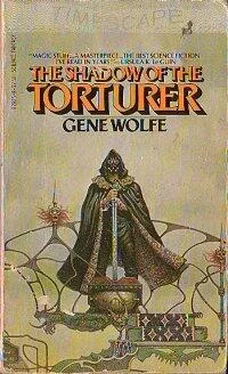In the winter I seldom came to the necropolis, but in summer that violated mausoleum and others provided me with places of observation and cool repose. Drotte and Roche and Eata came too, though I never guided them to my favorite retreat, and they, I knew, had secret places of their own. When we were together we seldom crept into tombs at all. Instead we made swords of sticks and held running battles, or threw pinecones at the soldiers, or scratched boards on the soil of new graves and played draughts with stones, and ropes and snails, and high-toss-cockle.
We amused ourselves in the maze that was the Citadel too, and swam in the great cistern under the Bell Keep. It was cold and damp there even in summer, under its vaulted ceiling beside the circular pool of endlessly deep, dark water. But it was hardly worse in winter, and it had the supreme advantage of being forbidden, so we could slip down to it with delicious stealth when we were assumed to be elsewhere, and not kindle our torches until we had closed the barred hatch behind us. Then, when the flames shot up from the burning pitch, how our shadows danced up those clammy walls!
As I have already mentioned, our other swimming place was in Gyoll, which winds through Nessus like a great, weary snake. When warm weather came, we trooped through the necropolis on our way there—first past the old exalted sepulchers nearest the Citadel wall, then between the vainglorious death houses of the optimates, then through the stony forest of common monuments (we trying to appear highly respectable when we had to pass the burly guards leaning on their polearms). And at last across the plain, bare mounds that marked the interments of the poor, mounds that sank to puddles after the first rain. At the lowest margin of the necropolis stood the iron gate I have already described. Through it the bodies intended for the potter’s field were borne. When we passed those rusting portals we felt we were for the first time truly outside the Citadel, and thus in undeniable disobedience of the rules that were supposed to govern our comings and goings. We believed (or pretended to believe) we would be tortured if our older brothers discovered the violation; in actuality, we would have suffered nothing worse than a beating—such is the kindness of the torturers, whom I was subsequently to betray. We were in greater danger from the inhabitants of the many-storied tenements that lined the filthy street down which we walked. I sometimes think the reason the guild has endured so long is that it serves as a focus for the hatred of the people, drawing it from the Autarch, the exultants, and the army, and even in some degree from the pale cacogens who sometirnes visit Urth from the farther stars.
The same presentment that told the guards our identity often seemed to inform the residents of the tenements; slops were thrown at us from upper windows occasionally, and an angry mutter followed us. But the fear that engendered this hatred also protected us. No real violence was done to us, and once or twice, when it was known that some tyrannical wildgrave or venal burgess had been delivered to the mercy of the guild, we received shouted suggestions as to his disposal—most of them obscene and many impossible. At the place where we swam, Gyoll had lost its natural banks hundreds of years ago. Here it was a two-chain-wide expanse of blue nenuphars penned between walls of stone. Steps intended for boat landings led down into the river at several points; on a warm day each flight would be held by a gang of ten or fifteen brawling youths. The four of us lacked the strength to displace these groups, but they could not (or at least would not) deny us admission, though whichever we chose to join would threaten us as we approached and taunt us when we were in their midst. Soon, however, all would drift away, leaving us in sole possession until the next swimming day.
I have chosen to describe all this now because I never went again after the day on which I saved Vodalus. Drotte and Roche believed it was because I was afraid we would be locked out. Eata guessed, I think—before they come too near to being men, boys often have an almost female insight. It was because of the nenuphars.
The necropolis has never seemed a city of death to me; I know its purple roses (which other people think so hideous) shelter hundreds of small animals and birds. The executions I have seen performed and have performed myself so often are no more than a trade, a butchery of human beings who are for the most part less innocent and less valuable than cattle. When I think of my own death, or of the death of someone who has been kind to me, or even of the death of the sun, the image that comes to my mind is that of the nenuphar, with its glossy, pale leaves and azure flower. Under flower and leaves are black roots as fine and strong as hair, reaching down into the dark waters.
As young men we thought nothing of these plants. We splashed and floated among them, pushed them aside, and ignored them. Their perfume countered to some degree the foul odor of the water. On the day I was to save Vodalus I dove beneath their crowded pads as I had done a thousand times. I did not come up. Somehow I had entered a region where the roots seemed far thicker than I had ever encountered them before. I was caught in a hundred nets at once. My eyes were open, but I could see nothing—only the black web of the roots. I swam, and could feel that though my arms and legs moved among their millions of fine tendrils, my body did not. I grasped them by the handful and tore them apart, but when I had torn them I was immobilized as ever. My lungs seemed to rise in my throat to choke me, as if they would burst of themselves out into the water. The desire to draw breath, to suck in the dark, cold fluid around me, was overwhelming.
I no longer knew in what direction the surface lay, and I was no longer conscious of the water as water. The strength had left my limbs. I was no longer afraid, though I knew I was dying, or perhaps already dead. There was a loud and very unpleasant ringing in my ears, and I began to see visions. Master Malrubius, who had died several years before, was waking us by drumming on the bulkhead with a spoon: that was the metallic din I heard. I lay in my cot unable to rise, though Drotte and Roche and the younger boys were all up, yawning and fumbling for their clothes. Master Malrubius’s cloak was thrown back; I could see the loose skin of his chest and belly where the muscle and fat had been destroyed by time. There was a triangle of hair there, and it was as gray as mildew. I tried to call to him to tell him I was awake, but I could make no sound. He began to walk along the bulkhead, still striking it with his spoon. After what seemed a very long time he reached the port, stopped and leaned out.
I knew he was looking for me in the Old Yard below. Yet he could not see far enough. I was in one of the cells below the examination room. I lay there on my back, looking up at the gray ceiling. A woman cried but I could not see her, and I was less conscious of her sobs than of the ringing, ringing, ringing of the spoon. Darkness closed over me, but out of the darkness came the face of a woman, as immense as the green face of the moon. It was not she who wept—I could hear the sobs still, and this face was untroubled, and indeed filled with that kind of beauty that hardly admits of expression. Her hands reached toward me, and I at once became a fledgling I had taken from its nest the year before in the hope of taming it to perch on my finger, for her hands were each as long as the coffins in which I sometimes rested in my secret mausoleum. They grasped me, pulled me up, then flung me down, away from her face and from the sound of sobbing, down into the blackness until at last I struck what I took to be the bottom mud and burst through it into a world of light rimmed with black.
Читать дальше










